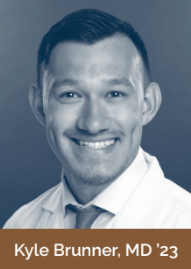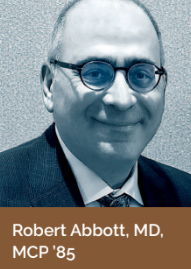
By all measures, Kyle Brunner, MD ’23, was what you would call an involved student at Drexel University College of Medicine. A class president for all four years of medical school, an alumni representative for his class, and a voting member of the school admissions committee, Brunner took advantage of the school’s many opportunities.
But it wasn’t until his third year, as he tried to decide on a specialty, that Brunner pursued perhaps the best opportunity on offer: the fact that he didn’t have to navigate all of the big decisions on his own.
In February 2022, after an Alumni Association board meeting focused on connecting current students with alumni practicing in different specialties, Brunner decided to reach out to someone in the specialty he was considering, radiology. At the top of the alphabetical list was Robert Abbott, MD, MCP ’85.
Within an hour of Brunner’s introductory email, they had a phone call scheduled for that afternoon. The mentorship that soon took root continues to guide and transform Brunner’s path and the paths of those he touches in turn.
As Brunner has prepared for a residency in radiology — a preliminary year at St. Luke’s Hospital-Anderson Campus, to be followed by a radiology residency at Brown — he’s quick to say: “I don’t think I could have accomplished all the things I’ve done in medical school without a mentor like Dr. Abbott.”

Taking Care of Our Own
Mentorship grows from experience; where we come from shapes what we have to share. For Abbott, mentorship is part of a responsibility for communal care that he learned in the military, where he served from 1981 until 2006 after receiving a scholarship as a part of the Health Professional Scholarship Program.
“In the military, everybody has to take care of each other. That’s kind of what we do, right?” Abbott says. Sometimes, that kind of care means stepping up to fill a gap. Abbott thinks back to a dear friend he made in the United States Air Force when he was a flight surgeon.
His friend Dave was one of the squadron pilots. “I got married, he got married. I had children, he had children. I’ve known him my entire career in the Air Force and my entire time as radiologist,” Abbott recalls.
Over the years, Abbott ended up becoming a mentor to his friend’s son Evan, who elected to pursue a career in medicine. Evan thrived academically, and in March of 2020, he and his girlfriend (now fiancée), also a Drexel University College of Medicine student, both matched at Johns Hopkins in Radiology. Evan’s father, by then a longtime commercial airline captain, lived to see that proud match, but didn’t have the chance to see Evan graduate medical school. In April 2020, he was admitted to the hospital with COVID-19, where he passed away in July after a long struggle and months on a ventilator.
It was a profound and emotional loss for family and friends. “I tried to provide support the best way I knew how,” Abbott says. Abbott, who lives in Baltimore, continues to be a mentor for Evan, and for others in Philadelphia and elsewhere. Though it’s not a substitute for in-person relationships, Abbott says, the normalization of video calls has made it easier to make that first connection, including for students who are considering practice in a geographical area different from that of their medical school.
A Shift in Mindset
Brunner was first drawn to medicine during an undergraduate internship at the National Institutes of Health, where he was inspired by the professionalism and compassion of one of the physicians working with a mistrustful patient who had a rare genetic disorder. Watching the doctor connect with that angry patient and validate their feelings, Brunner says, amazed him: “I thought, ‘That’s real medicine, right there.’”
What brought Brunner to Drexel was the school’s focus on the underserved and the “flipped” classroom model, which he says makes for more integrative class periods. The pressure and uncertainty around big decisions isn’t always easy to shoulder, but having a great mentor makes all the difference, personally as well as professionally.
“I feel like a lot of times I really focus on the negative, what’s going wrong and what I didn’t achieve. That’s the mindset I sometimes call Dr. Abbott with, and he helps reframe it,” Brunner says. “Talking to Dr. Abbott is like talking to a father figure. It’s always so supportive. During the whole residency application process, there are a lot of moments where self-doubt creeps in. But I knew whenever I talked to him, I would always feel so much better.”
Over time, that mindset shift begins to set. “I just felt like I was getting showered with praise. Like I could just do anything in the world,” Brunner says. “It’s kind of new to me.”
Mentorship Is Mutual
There’s an old saying among pedagogues that no one is too big to learn nor too small to teach. Personally, Abbott doesn’t believe in one-sided relationships. In fact, he’s insistent that he receives more than he gives as a mentor.
“Mentorship is an amazing opportunity after a long career to ensure that our students do well, and it will provide you with a lot of satisfaction seeing them flourish,” he says. “The ability to give back really is a gift.”
One of the first steps in being a good mentor, he says, is to be a good correspondent. (Remember Abbott’s speedy reply to Brunner’s first email? There’s no story without it.) The second is to view students as future colleagues and peers. To that end, his aim is to be a facilitator, providing a pathway to good decision-making rather than a set of steps to follow. And while Abbott’s own enjoyment comes from the fun of watching someone develop, there is one measure of reciprocity he’s adamant about.
“I tell the students I interact with, ‘You don’t owe me anything. I’m getting a lot of pleasure out of this by seeing you do well. But you do have to do one thing for me, which is to pay it forward.’ And that’s how the system should work.”
Forward and Onward
Brunner took the “pay it forward” doctrine seriously before graduating, helping to set up a first-year mentorship program that pairs incoming students with fourth-years. Learning to navigate new systems, manage the work’s mental and emotional demands, and address grievances appropriately are all places where first-year students can benefit from those on their way out. “By the time they’re in my shoes, they’re going to achieve so much more than I did,” Brunner says.
First-year students shouldn’t stop at peer mentorship, Abbott urges. It’s never too soon to get connected to alumni. “With these really complex practice environments, with all this talk of burnout and moral injury, what we need is young physicians to have careers that are sustainable and healthy. And those of us who are toward the end of our careers hopefully provide some insight as to how you achieve that.”
Abbott also encourages more alumni to take advantage of opportunities to step into mentorship roles. The first step, he says, is just to see what opportunities are available. All it takes is an email to Nikki Bromberg, director of campus partnerships in the Office of Alumni Relations, at nlb67@drexel.edu. “We’ve all benefitted by our ability to attend medical school. It’s a privilege,” Abbott says. “And my feeling is that you have to pay it forward.”
Not all mentorships look the same. Abbott believes that mentorship isn’t “one-and-done,” that it often even stretches beyond residency and fellowship. And certainly, Brunner has been more involved than your typical student. But regardless of the shape your mentorship takes, it makes a world of difference.
“We want the Alumni Association to be a resource for students,” Abbott says. “Between Hahnemann, MCP and Drexel, there are a lot of graduates out there. It’s a big school at this point. There’s a lot of untapped opportunity.”
Alumni interested in learning more about becoming a mentor for Drexel medical students should contact Nikki Bromberg, director of campus partnerships in the Office of Alumni Relations, at nlb67@drexel.edu.